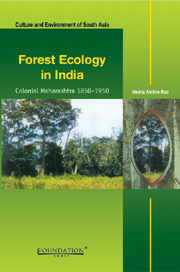Book contents
- Frontmatter
- Contents
- Preface
- Glossary
- Maps
- 1 Introduction
- 2 Pre-Colonial Maharashtra
- 3 Early British Management of Forests
- 4 Evolution of Forest Policy and Forest Acts of 1865 and 1878
- 5 Implementation of 1878 Act
- 6 Forest Policy During 1900–1950
- 7 People's Resistance
- 8 Conclusion
- Appendix - I
- Appendix - II
- Bibliography
- Index
8 - Conclusion
Published online by Cambridge University Press: 26 October 2011
- Frontmatter
- Contents
- Preface
- Glossary
- Maps
- 1 Introduction
- 2 Pre-Colonial Maharashtra
- 3 Early British Management of Forests
- 4 Evolution of Forest Policy and Forest Acts of 1865 and 1878
- 5 Implementation of 1878 Act
- 6 Forest Policy During 1900–1950
- 7 People's Resistance
- 8 Conclusion
- Appendix - I
- Appendix - II
- Bibliography
- Index
Summary
The formation of the Forest Department, imposition of several Forest Acts and their application by way of day-to-day administration have had an unprecedented and everlasting impact on Indian society.
From the earliest periods of known Indian history, there is a record of human interaction with and human intervention in natural surroundings. However, the major difference between the pre-British period and British period lies in the scale and magnitude of this intervention, and the everlasting impact it has had on the society. An attempt has been made in this book to study the formation of the Forest Department, the evolution of its policies and the unprecedented impact it has had on the society in Maharashtra.
The basic assumption underlying the formation of the Forest Department by the British was that Indians lacked the sense of conservation, and hence there was a need to introduce scientific conservation of forests. However, the more compelling factor was fulfillment of the timber requirements of their home country. In order to fulfill these demands, there was a need to legitimise the exploitation of forests which was attempted by way of passing several Forest Acts.
The geography of the region, its climatic conditions and the types of forests in the Bombay Presidency along with their commercial potentialities, had a definite bearing on the evolution of British forest policy.
The history of Maharashtra along with the socio-economic conditions prevailing in this region during the medieval period reveals that there was a close inter-relationship between political interference and the level to which natural resources were exploited.
- Type
- Chapter
- Information
- Forest Ecology in IndiaColonial Maharashtra, 1850-1950, pp. 211 - 223Publisher: Foundation BooksPrint publication year: 2007



